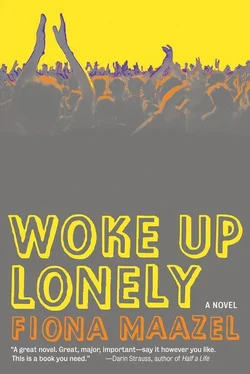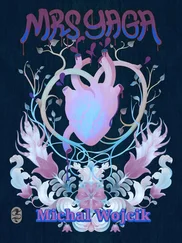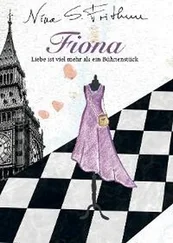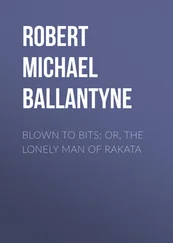Linda said, “Ida and I were just finishing up this snowman,” and, to Ida, “What’s his name again?”
“Don.”
Esme was not sure she’d ever heard a name spoken with greater spite. Ida jammed a stick in his eye and looked at her mom. “Your clothes are ugly,” she said, and she marched back into the house.
“That went well,” Esme said. “Don? Who names her snowman Don?”
“She’s right, you know. If you’re going wear that nonsense, at least join the army. Be for real.”
Esme shrank a couple of feet. Her parents had only a vague sense of what she did, enough to know it screwed them up — New identities? Really? — but not enough to think it worth the trouble to find out more. Perhaps her father was more sympathetic, but she didn’t know; they didn’t talk.
She fixed the snowman’s eye. Apologized for his care.
“Not to worry,” Linda said. “He’s cold as ice,” and then she grinned, and to Esme this grin might have seemed stupid, except that nothing about her mother was ever stupid. She was too sharp and cagey to grin like that unless it was for sport or design. “Now, listen,” she said. “I’m glad you’re here. I’ve got news.”
Esme followed her through the snow. Her mother was the kind of woman who always liked to speak her beef with someone hungry for it.
“Is it Ida? She looks okay to me. Or, wait, is it school? Is she failing at school?”
Linda looked on her with what had to have been contempt, though maybe it was contempt plus pity, which is kind of like cherry Pepto — not so bad.
“It’s about your brother,” she said. “Chris.”
“Right, because I’ve actually forgotten his name.”
They were on the patio under porch lights. Esme sat at the table, her mom nearby.
“We got a call from the hospital,” Linda said.
The words sounded tense but happy, and since Esme still had no idea how her mother felt about Chris in a coma all these years, she assumed this meant he was dead. A twenty-four-year nap comes to an end, and her mother is released from the emotional vigil she’d been on or wanted to be on: both seemed exhausting.
Linda leaned forward, elbows on the table. She spoke the next part slow. “He said something. Out loud. A nurse just happened to be there.”
The news blew Esme well back into her chair. Her brother’s voice. She didn’t even know its sound. “Out of the blue?” she said. “He’s awake? What did he say?”
Linda picked up a bird carved out of wood, small as soap, and hopped it along the edge of the table. “The doctors said this could be prelude to waking up. But not to get excited.”
Esme was surprised the doctors would presume interest let alone enthusiasm in relatives who never came, never called, but then maybe to them family was just family; you can’t judge ’em all.
“Wow,” she said, because what else was there? Apparently, a lot. Linda got in close to the bird, as though talking to the bird. In fact she was talking to the bird; it sure as hell beat talking to Esme. She said, “Of all the things. Of all the times I imagined this happening.”
Now the bird was in her palm, eye to eye. “What’s that? You want to know what he said?” She faced the thing at Esme. “Go on, tell her,” and then, “Oh, fine, I’ll tell her. He said, you ready for this? He said Esme. Loud and clear, too. They were amazed. Not like he’d been asleep for a quarter of a century, not like he hadn’t used his lips in as long, but just like he was in the middle of a conversation. A heated one, too. They said he sounded mad.”
Esme had been shaking her head for a while. Her darling brother reliving their fight day after day, the anger still on his lips, with no sense of the years that had passed, him still fourteen years old. It is 1981. Ronald Reagan has just taken the oath. The president says, “We’re going to begin to act, beginning today,” and the next day, her brother’s life stops, and all because she let his friend ejaculate on her chest.
Linda continued to hop the bird across the table and even to chirp on its behalf, the stupid smile back on her face.
“Have you been to see him?” Esme said.
“He’s been screaming for a year, what do you think?”
“What screaming? He screams? Why didn’t anyone tell me?”
“Are you serious?”
Esme had begun to take issue with the bird and to concentrate anger in the bird and to make the bird proxy for all the ways she did not love her brother, daughter, parents, enough, and so, yes, she snatched it from Linda’s hand and hurled it over the balustrade.
Linda stood. She seemed verged on the kind of laugh that sizes you down for life. But no, she just stood. Stood and stretched and said, “Ida and me made pineapple upside-down cake. Let’s eat.”
“ Now? I want to talk to you.”
“I’m hungry.” And with that she slapped the table, and the laugh Esme had braced for came out. Her brother speaks for the first time in twenty-four years and her mother wants pineapple upside-down cake? Esme leaned forward and had a good look — at her mother’s face and mostly her eyes. The red tracery of veins fencing her pupils. The Windex shine in each lens. The part where her lids were barely half-open, in contrast to Esme’s mouth, which was hanging way open now that she realized her mother was stoned. Had been stoned this whole time.
Esme knew Linda had smoked in the sixties, was a big old hippie. But she was seventy-one, and how did someone her age even acquire marijuana? The nearest neighbor was a soldier just back from Iraq. Maybe he got high for having killed in a war without cause and maybe because he also tended chickens and harvested their eggs and brought her mother a dozen every week, he brought her a little something else, too.
Linda cleared her throat, and, with the firmness Esme had come to expect from her but which was no comfort now, she said, “I want cake.”
Fine. They went inside. Her dad was at the computer in the living room, under a bearskin nailed to the wall. Not just the bear but the head too, and an old-timey rifle captioned underneath, so it was hard to know which was displayed as the better prize. Her parents had bought the place furnished, but after ten years, if you’re still living with a dead bear on your wall, you’re doing so for a reason. Her dad was distraught; she watched him type. Most people of his generation finger-peck and get right up to the screen, but since he only had one arm and giant googly glasses, his deportment was in a school of its own.
“His friends, ” Linda said, and snorted her way to the kitchen. “He gets one night a week. Let’s go, Bill!”
His hand fell on the keyboard like Play-Doh. He looked up at Esme and the look was bleak. She touched his arm, though it did no good. You can’t solace a man whose only friends are text.
Esme said, “Come on, Dad, we’re having cake.”
He pushed back his chair but didn’t get up. His empty sleeve hung over the armrest, and the awful thing was, you barely noticed for how slack the rest of his body was. He stared at the screen like the dead stare at us.
Esme made for the fridge.
Her dad trudged to the table when it was clear Linda would not stop calling his name. Esme sat next to Ida, though she still hadn’t said a word since Don. Her mother knifed the cake, but served only herself, a quarter wedge, huge. Her dad wasn’t hungry. Ida said it tasted gross, while Linda, who had retained her good cheer throughout, opened her mouth — her mouth was full — and said, “Now, Esmeralda, daughter mine, would you like to say something about Thurlow Dan and the Helix? Because I think maybe this little lady should know more of the world than she does.”
Читать дальше












